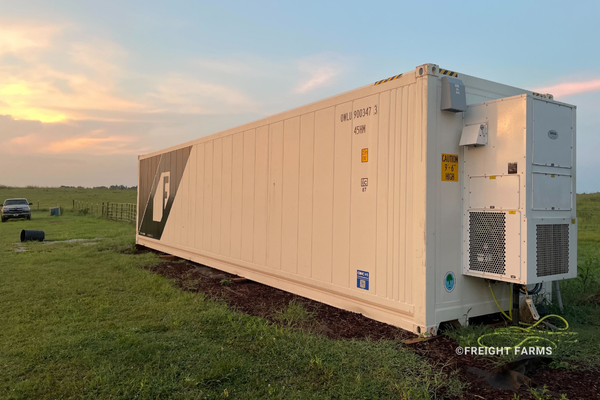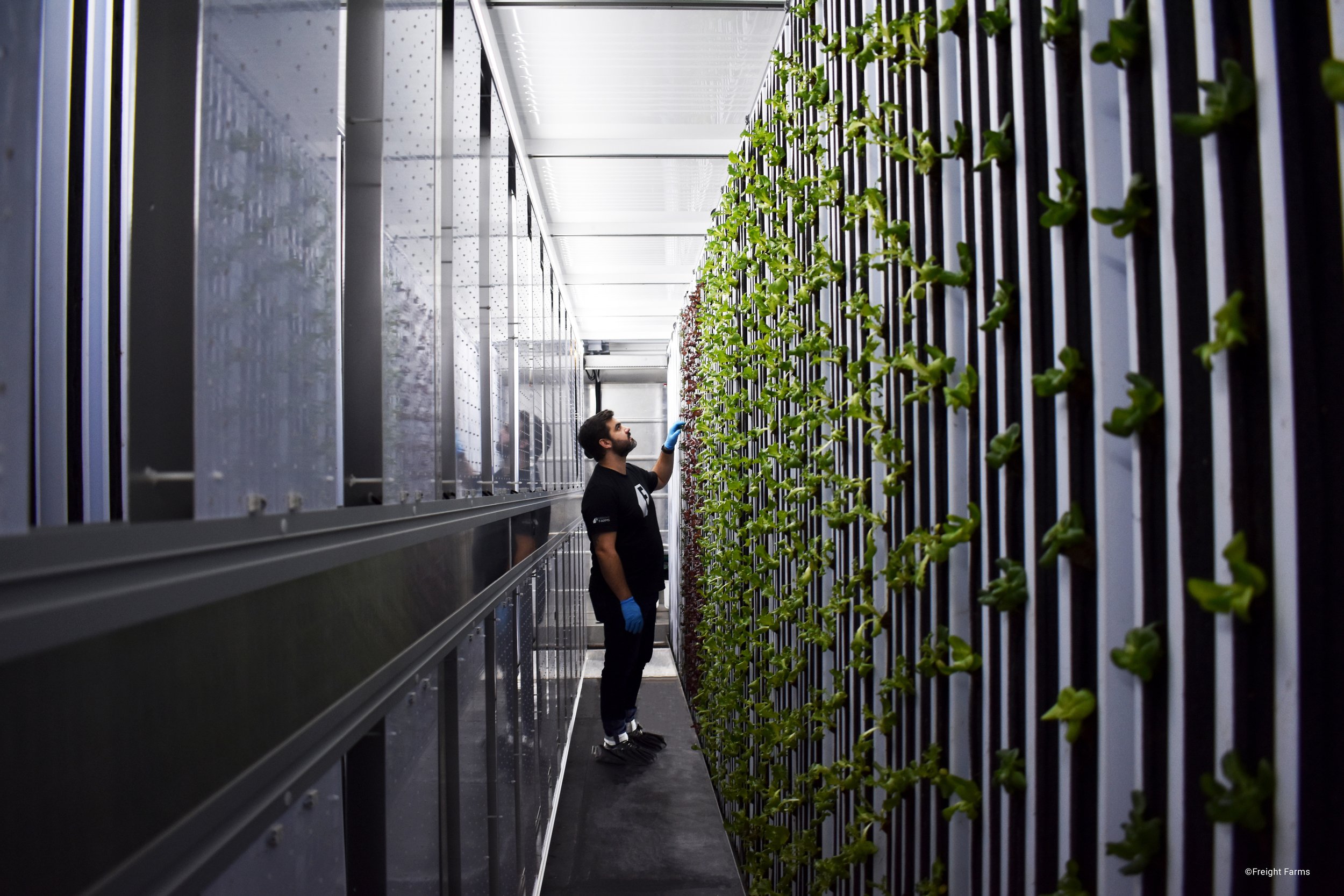Freight Farmer Q&A: Nabeela Lakhani
6 QUESTIONS WITH NABEELA LAKHANI OF SQUARE ROOTS
One of the best parts of being part of the Freight Farms team is talking to our freight farmers and hearing about their successes, their businesses, their customers, and their challenges. They are a wealth of information, so now we are sharing some of their stories with you!
In fall of 2016, Kimball Musk launched Square Roots, an urban farming accelerator program focused on training ten young entrepreneurs at a time to grow fresh, tasty, food year-round in Brooklyn, New York. The accelerator, which leverages Freight Farms technology, provides each entrepreneur with a Leafy Green Machine to run as a business for one year. With the end of the program's first year in sight, we spoke with Nabeela Lakhani, one of the Square Roots Resident Entrepreneurs about her experience in the program, her plans for the future, as well as her thoughts on the food system.
Freight Farms (FF): What motivated you to get involved with Square Roots?
Nabeela Lakhani: The story started when I was a 16-year-old in high school, one of our required readings was Fast Food Nation. My mind was blown reading about what goes on in the fast food industry, and I was horrified. I knew then that I wanted my impact to be in the food industry. And I thought that the way I would do that would be in the world of public health and nutrition, so that’s what I majored in when I started school at NYU. As I went through my four years studying nutrition, I didn’t feel connected to it the way I expected. I found it too clinical, but I also felt that it wasn’t solving the right issue. Here I was studying how to treat patients with Medical Nutrition Therapy for diabetes, but I was motivated by the idea that if we nourish our communities and populations better, diabetes wouldn’t be such an epidemic.
I guess in college I became more self-aware and understood more accurately what I cared about. During my last year in school, I realized that the root problem lies in our current industrial food system. We produce food really poorly in this country, and distribute it inequitably, and thus have a whole slew of side effects such as health issues, food access and affordability issues, food deserts, and now, just general trust issues with this current system. Around this time last year, Square Roots was coming together as a company, and once I got connected to them, I was really excited about joining. I knew it was going to give me hands-on experience growing and selling my own food, which would open my eyes to the strengths and challenges involved with farming, production, distribution, and give me the foundation on which to start thinking and working on solutions.
FF: What are your plans for after you graduate from the Square Roots accelerator program?
NL: As of now I think I’m going to look for other opportunities in the urban farming space, most likely another startup that’s doing similar work making an impact on food and agriculture. I'd also like to spend some serious time trying to build and develop my own business, whatever that may be.
FF: We read that you also work as a resident farmer, how did you get that role and what has the impact been?
NL: I’m currently working with a market-to-table restaurant in Soho called Chalk Point Kitchen, the owner and chef and team over there have been super excited about our new farms. They’ve all come to visit the farm, and instantly the owner was committed to supporting both the farms and me as a young entrepreneur. So I’ve been in partnership with them for the past couple months where they buy my whole farms’ weekly yield of greens, and then they get a ton of added value regarding marketing and competitive advantage in a few different ways. The first and biggest, which both myself and the owner were super excited about, was them being able to say “we have our very own Chalk Point Kitchen farmer, who grows only for us, right here in Brooklyn, and she hangs out here at the restaurant three nights a week to meet and chat with our customers.” At no other restaurant in NYC can you meet your farmer during dinner, while eating the salad that was harvested within 48 hours. It’s a really novel, memorable, and valuable experience for customers, especially people who are eating a farm-to-table, local-oriented restaurant. It strengthens the trust in that restaurant and makes for a unique experience to talk to your farmer, know where your food is coming from, and know that someone who cares about food is behind what you’re eating.
“Eventually, so many people will be growing their own food in some capacity that we’ll all be farmers and take food back into our own hands.”
FF: How do you see the farm-to-table movement shifting as farmers become more accessible to consumers?
NL: The chef gets to choose what he wants me to grow, so if he wants a particular, rare herb, all year round, we can grow it for him. And then there’s mutual marketing. We plan to do events together, and anytime I get interviewed for the press, I talk about my partnership with them and highlight them as a pioneer restaurant for being committed to local farmers and the real food movement, and understanding that food is more than a commodity – it builds connections and communities.
I think there needs to be a shift in how we view and think about farmers. Farmers are super cool and important. And as the real food movement takes hold globally, farmers are the future. Farmers should be proud of what they do, and consumers should be proud of what farmers do, and a vision I have is a future where this type of partnership becomes the norm, and every restaurant you go to has a resident farmer that is so local, you can actually meet every so often at the restaurant. Eventually, so many people will be growing their own food in some capacity that we’ll all be farmers and take food back into our own hands.
FF: What’s your favorite crop to grow and why?
Interested In Becoming a Square Roots Entrepreneur? Applications are Now Open
NL: My two favorite crops to grow are kale (any variety) and Red Giant mustard greens, for two different reasons. I like having a super clean farm (clean towers, clean crops, no dripping water), and kale is the most wonderful crop for that! It grows beautifully, doesn’t need a lot of attention, is super resilient, and tastes so good out of the LGM. The Red Giant mustard greens hold a special place in my heart because of the hilarious reactions people have when they eat them. They’re a Japanese variety of mustard greens and have a strong horseradish flavor, an almost wasabi-like sensation where they make your nose sting and your eyes water, and people love it! It’s crazy that a plant can do that, and I think you can only experience that when something is as fresh as what we give, and that’s when people really get that our greens are just tastier, more flavor packed, and fresher.
FF: What is one small change everyone can make in their daily lives to make a big difference in our food system?
NL: I think one super easy thing that everyone can do (and many people still don’t) is to just take a moment to think about where you think your food came from. Once you do that you’ll realize that, for most of what we eat, we have zero idea where it’s coming from, and sometimes no idea what it’s even made of. That’s the first step, to recognize that that is a problem.














Future planning for your Freight Farms delivery? Learn what your site needs, what to expect on delivery day, and how to avoid common surprises.